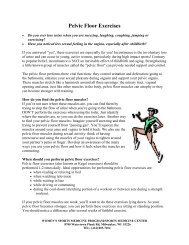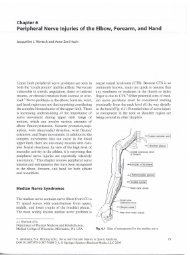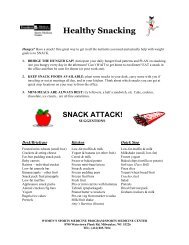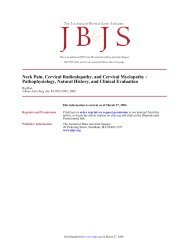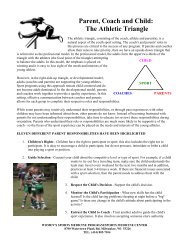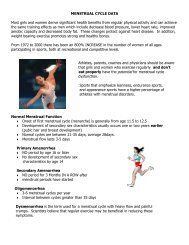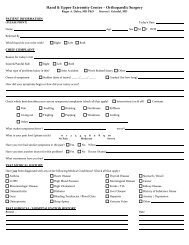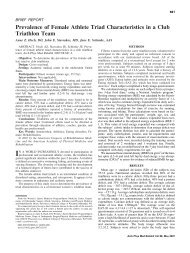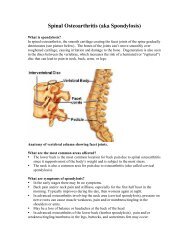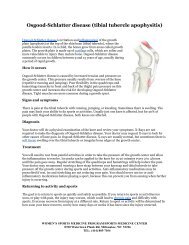A Coach's Self Assessment
A Coach's Self Assessment
A Coach's Self Assessment
Create successful ePaper yourself
Turn your PDF publications into a flip-book with our unique Google optimized e-Paper software.
A <strong>Coach's</strong> <strong>Self</strong> <strong>Assessment</strong>Are You Crossing the Line with anAthlete?The purpose of this questionnaire is to alert coaches to boundary issues which might be interfering with theirability to work effectively with a team or an athlete. Coaching is an emotionally intense profession. Strong bondsand emotions are part of the job. The line between appropriate and inappropriate behavior is often a matter ofintent and context. The following list of questions is intended to help coaches know when they may be extendingthe boundaries of their role as coach and potentially crossing the line with an athlete.Check any statements which reflect your behavior or attitude toward an athlete:1. I often tell my personal problems to this athlete.2. I want to be friends with this athlete when his/her career ends.3. To be honest, my physical contact with this athlete is motivated by desires thatgo beyond an attempt to support and motivate the athlete.4. I find myself thinking of ways to work individually with this athlete and inspecial practice sessions which run before or after practice.5. This athlete invites me to social events, and I don't feel comfortable sayingeither yes or no.6. There is something I like about being in the office with this athlete when noone else is around.7. The athlete feels more like a friend than someone I coach.8. I have invited this athlete to public/social events which were not teamfunctions.9. I often listen to the personal problems of this athlete.10. I find myself wanting to coach practices when I know this athlete will be thereand unusually disappointed when this person is absent.11. I find myself cajoling, teasing, and joking a lot with this athlete.12. I find myself talking a lot about this athlete to other people.13. I find myself saying a lot about myself with this athlete -- telling stories, engaging in peer-like conversation.14. This athlete has spent time at my home (other than a team function).15. I am doing so much on this athlete's behalf I feel exhausted.16a. I agreed to take this athlete on for a very low fee, and now I feel like I need to be paid more for my work. OR16b. I agreed to take this athlete on for a very low fee, and now I feel like I need to get more out of this athlete.17. I find myself looking at this athlete's body in a sexual fashion.18. I make comments to my athletes about bodies which have no relevance to the sport.19. Sometimes I worry this athlete is going to get so good he/she thinks he/she doesn't need me.20. Sometimes I resent this athlete's success.21. To be honest, sometimes I make demands on this athlete with the intention of limiting his/her social life.22. I find myself making sexual jokes around this athlete.23. To be honest, I feel jealous when this athlete spends time with other people.24. Sometimes I check up on this athlete, wanting to know what he/she is doing when he/she is away frompractice.WOMEN’S SPORTS MEDICINE PROGRAM/SPORTS MEDICINE CENTER8700 Watertown Plank Rd, Milwaukee, WI 53226TEL: (414) 805-7104
SELF ASSESSMENTCoaching involves intense emotional and complicated relationships withathletes. It is difficult to make blanket statements about what is appropriate andinappropriate behavior. Certain items above might not always reflect poorcoaching. This self administered test is offered as a means to locate potentialmoral and professional dilemmas.If you checked any of the above statements you may be crossing the linebetween appropriate and inappropriate behavior. If you are unsure if thebehavior is ethical and professional discuss it with colleagues. <strong>Self</strong> assessmentand peer supervision can help you avoid trouble before it starts.Below is a brief explanation of the items above.If you marked any statement between 1 and 14 you may have crossed the line between coach and friend. You maybe using your athletes to meet your own need of acceptance or companionship.If you marked 3 or 12, you may be using athletes to meet your own sexual or romantic needs in addition to yourneed for companionship.If you marked 9, you are potentially extending the coaching position into the role of counselor. You may be out ofyou league and you might suggest that the athlete seekprofessional advice.If you marked any statement between 15 and 24 you maybe exhibiting excessively controlling behavior and youmay not be thinking of your athletes as people but objects-- means to an end. You may want to assess if you areoverly dependent on your athletes for your sense of self.If you marked 15, 16, 19, 20, you might be thinkingabout athletes in an instrumental manner and/or feelingunder appreciated. You may be at risk of potentiallyabusing your power in order to even things up.If you marked 17, you may be looking at athletes assexual objects rather than as human beings. This sort ofthinking combined with other controlling attitudes can facilitate a coach making unwanted sexual advances.If you marked 18, 22, you may be contributing to a hostile environment (sexual harassment). Further, someabusive coaches assess the likelihood an athlete will report a sexual advance by judging an athletes response tosexual remarks.If you marked 21, 23, 24, you may be thinking about athletes in an overly possessive fashion. You may need tostep back and assess how much emphasis you are placing on sport in your athletes’ lives, as well as your owndesire to be in control of athletic contests.If you checked a number of statements between 15-24 in conjunction with some between 1-14, you shouldevaluate your coaching methods. The combination of gaining trust in an unprofessional manner and overt controland objectification of the athlete may be very problematic.WOMEN’S SPORTS MEDICINE PROGRAM/SPORTS MEDICINE CENTER8700 Watertown Plank Rd, Milwaukee, WI 53226TEL: (414) 805-7104



